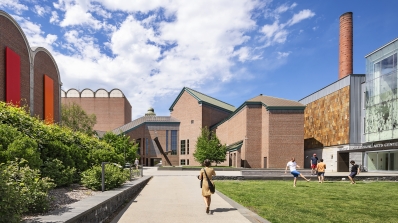Exhibitions Archive
Artists Celebrating the White Mountains
When Men and Mountains MeetPrivate Portraits/Public Conversations
Félix de la ConchaThe Hood Museum of Art continues its series of major public art projects, in conjunction with the Dartmouth Centers Forum, in a multimedia exhibition of fifty-one portraits exploring the ways members of the Dartmouth and Upper Valley communities have encountered conflict and how they made--or are making--the journey toward reconciliation.
De la Concha's effort to capture a truthful portrait results in a multidimensional representation of his encounter with his sitters--each one is intellectually, psychologically, and emotionally charged. Each portrait session lasted two hours, during which time the artist interviewed the sitter, and video- and audio-taped the entire experience. The artist added the aspect of video recording for the Hood project as a means of reconstructing, in real time, what transpired in each two-hour session. Thus, "portrait" here comprises painted representation, spoken narrative, and the visual recording of the interaction between artist and subject.
Tapis from Lampung, South Sumatra, Indonesia
Wearing Wealth and Styling IdentityThe Caricature of Honoré Daumier
France in TransformationThe Origins of Mezzotint in the Seventeenth Century
The Quest for Printed ToneWabanaki Ash Splint Baskets from Maine
Spirit of the Basket TreeSpirit of the Basket Tree: Wabanaki Ash Splint Baskets from Maine, guest curated by Jennifer Sapiel Neptune, focuses on the rich visual dialogue between contemporary Wabanaki basket artists of Maine and the legacy of Native American basket making in northern New England and southeastern Canada. Originally created for indigenous use, baskets emerged as valued items of trade with European settlers during the colonial era. They have remained at the center of cultural exchanges between Wabanaki people and Americans of non-native descent up to the present day, serving to solidify cultural identity, perpetuate intergenerational continuity, and symbolize political sovereignty for Wabanaki tribal members through the centuries.
Jennifer Sapiel Neptune, a basket maker herself and a co-manager of the Maine Indian Basket makers Alliance (MIBA), also has written an essay for the gallery brochure that accompanies the exhibition.
